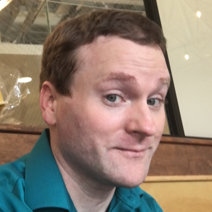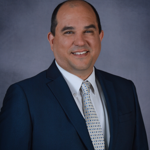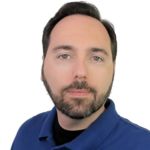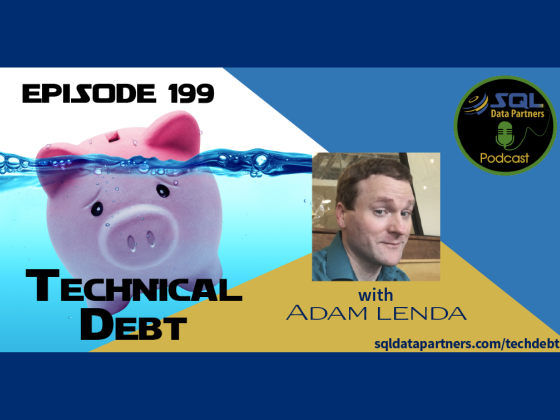Technical Debt
We can incur technical debt in several ways—aging technology, choosing delivery speed over scale architecture, or implementing new technology the entire team cannot yet support. I don’t know that I’ve ever worked at a place that hasn’t talked about technical debt. It wasn’t until I stumbled on a talk by Adam Lenda that make me think about the ways I might contribute to technical debt. He also gave some ideas of how I can help pay it off.
In this episode, we talk with Adam Lenda about what technical debt is, why we might be okay incurring some, and situations we might put ourselves into when trying to do ‘the right thing’. Adam also suggests some ways to pay off some of this burden and like most debt, there is no easy fix and he suggests running a pretty tight ship; however, I found his ideas insightful and I think you will, too.
Listen to Learn
00:38 Intro to the guest, team and topic
02:12 Compañero Shout-Outs
04:29 The mental model gap
06:05 Everyone’s thoughts and definitions around ‘technical debt’
08:00 To Adam, technical debt is friction
10:43 Technical debt vs “I just don’t like this”
13:53 “Consistently bad is better than intermittently good”
16:02 How often do you have ‘all hands on deck days’?
17:24 ‘Clean as you go’ is a fallacy
18:33 Eugene taking Kevin’s role of devil’s advocate
22:02 Kevin’s thoughts on methodologies
25:11 It all goes back to having and keeping a standard
26:23 Adam asks the team what they see as technical debt
28:48 Debt in programming languages is different than in databases
31:45 You have to communicate clearly from the beginning – don’t be a hero
35:53 Adam’s Three Maxims
39:17 The benefits you and your client get when you do these things
41:28 Adam would be happy to chat with you about an issue you’re having
42:31 SQL Family Questions
48:48 Closing Thoughts
Our Guest

Adam Lenda
Curious by nature, young Adam became obsessed with creative problem-solving. That passion found practical application in the quest to become a computer programmer. Years of self-education led to work as a Web, Windows, and mobile application developer.
Those skills lead to a diverse set of I.T. experiences throughout the 2000s. Including solutions development for Telecommunications, Insurance, Healthcare, Manufacturing, and E-commerce. Those opportunities both expanded Adam’s technical skills while also offering necessary leadership experience.
A software architect role, for an early-stage startup, brought new adventures for 2012. The focus on time-to-market, above all else, was a significant change from that of large established clients. Tough compromises, and lessons, came from balancing market demand, maintainability, security, and scalability.
2016’s revenue and stability brought a chance to begin addressing pain points around development team efficiency and accuracy. A shift in focus towards application maintainability was required. Yet there were many competing views and on how to achieve that goal.
False starts, and setbacks plagued early efforts. Yet, each failure taught a new lesson and established better practices. Those incremental improvements solidified into a sustainable strategy in 2018. Since that time, Adam now focuses his efforts on developing patterns and practices for sustainable Software Renovation.
Where you have friction in your architecture that is impacting your ability to get things delivered, that’s how I identify [technical debt]
Meet the Hosts

Carlos Chacon
With more than 10 years of working with SQL Server, Carlos helps businesses ensure their SQL Server environments meet their users’ expectations. He can provide insights on performance, migrations, and disaster recovery. He is also active in the SQL Server community and regularly speaks at user group meetings and conferences. He helps support the free database monitoring tool found at databasehealth.com and provides training through SQL Trail events.

Eugene Meidinger
Eugene works as an independent BI consultant and Pluralsight author, specializing in Power BI and the Azure Data Platform. He has been working with data for over 8 years and speaks regularly at user groups and conferences. He also helps run the GroupBy online conference.

Kevin Feasel
Kevin is a Microsoft Data Platform MVP and proprietor of Catallaxy Services, LLC, where he specializes in T-SQL development, machine learning, and pulling rabbits out of hats on demand. He is the lead contributor to Curated SQL, president of the Triangle Area SQL Server Users Group, and author of the books PolyBase Revealed (Apress, 2020) and Finding Ghosts in Your Data: Anomaly Detection Techniques with Examples in Python (Apress, 2022). A resident of Durham, North Carolina, he can be found cycling the trails along the triangle whenever the weather's nice enough.
Want to Submit Some Feedback?
Did we miss something or not quite get it right? Want to be a guest or suggest a guest/topic for the podcast?
